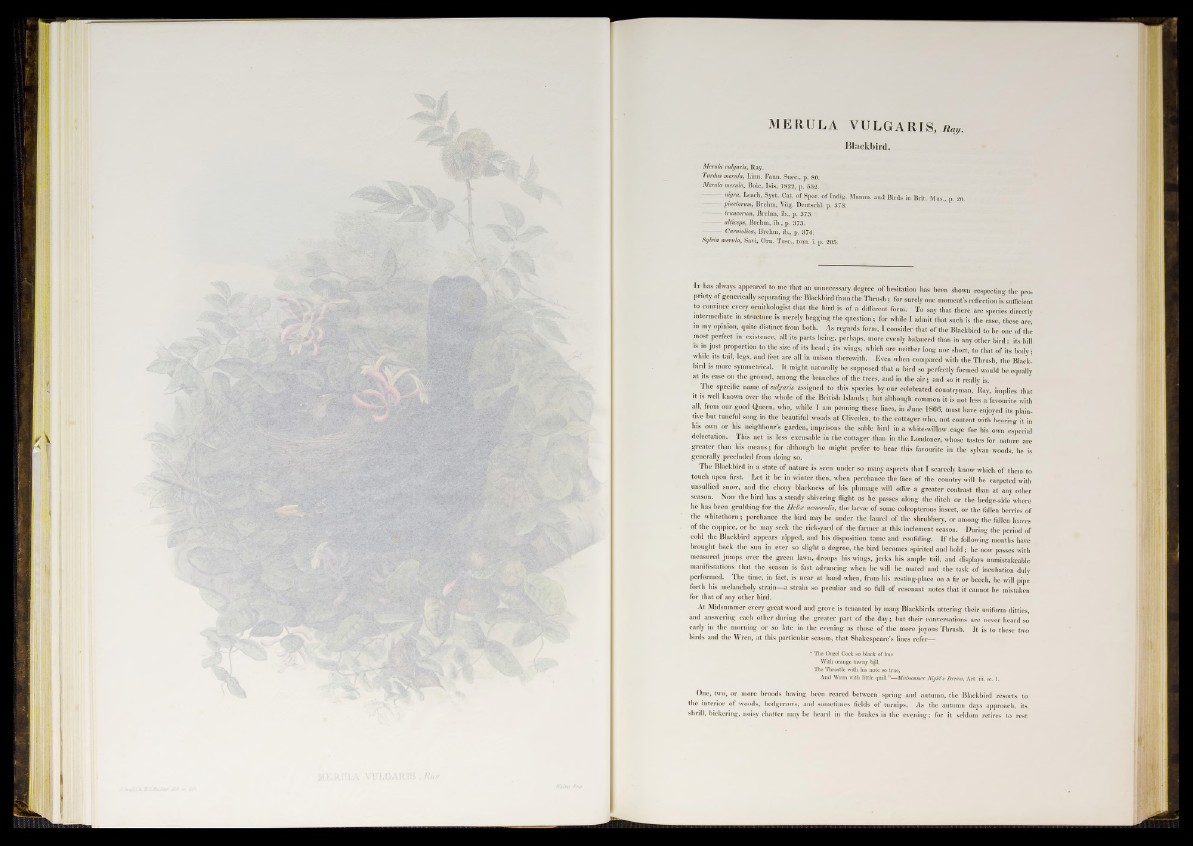
Blackbird.
Merula vulgaris, Ray.
Turdus merula, Linn. Faun. Suec., p. 80.
Merula merula, Boie, Isis, 1822, p. 552.
nigra, Leach, Syst. Cat. of Spec, of Indig. Mamm. and Birds in Brit. Mus., p. -20.
pinetorum, Brehm, Vog. Deutschl. p. 373.
truncorum, Brehm, ib., p. 373.
— alticeps, Brehm, ib., p. 373.
— Camiolica, Brehm, ib., p. 374.
Sylvia merula, Savi, Om. Tosc., tom. i. p. 205.
It Iras always appeared to me that an unnecessary degree of hesitation has been shown respecting the pro
pnety o f genetically separating the Blackbird from the T h ru sh ; for surely one moment’s reflection insufficient
to convince every ornithologist that the bird is of a different form. To say that there are species directly
intermediate in structure is merely begging the question ; for while I admit that such is the case, these are,
in my opinion, quite distinct from both. As regards form, I consider that of the Blackbird to be’ one of th¡
most perfect in existence, all its parts being, perhaps, more evenly balanced thau in any other b ird : its bill
is in just proportion to the size of its h e ad ; its wings, which are neither long nor short, to that o f its body ■
while its tail, legs, and feet are all in unison therewith. Even when compared with the Thrush, the Black!
bird is more symmetrical. I t might naturally be supposed that a bird so perfectly formed would be equally
a t its ease on the ground, among the branches o f the trees, and in the a ir ; and so it really is:
The specific name of mlgaris assigned to this species by our celebrated Countryman, Bay, implies that
it is well known over the whole o f the British Islands; b i t although common it is not less a favourite with
q)l, from our good Queen, who, while I am penning these lines, in June 1866, must have enjoyed its plaintive
but tuneful song in the beautiful woods at Cliveden, to the cottager who, not content with hearing it in
his own or his neighbour’s garden, imprisons the sable bird in a white-willow cage for his own especial
delectation. This act is less excusable in the cottager than in the Londoner, whose tastes for nature are
greater than his means; for although he might prefer to hear this favourite in the sylren woods, he is
generally precluded from doing so.
The Blackbird in a state o f nature is seen under so many aspects that I scarcely know which o f them to
touch upon first. Let it be in winter then, when perchance the face of the country will be carpeted with
unsullied snow, and the ebony blackness o f his plumage will offer a greater contrast than at any other
season. Now the bird has a steady shivering flight as he passes along the ditch or the bedge-side where
he has been grubbing for the Helix nemoralis, the larvae of some coleopterous insect, or the fallen berries of
the whitethorn ; perchance the bird may be under the laurel of the shrubbery, or among the fallen leaves
of the coppice, or he may seek the rick-yard o f the farmer at this inclement season. During the period of
cold the Blackbird appears nipped, and his disposition tame and confiding. I f the following months have
brought back the sun in ever so slight a degree, the bird becomes spirited and bold; he now passes with
measured jumps over the green lawn, droops his wings, jerks his ample tail, and displays unmistakeable
manifestations that the season is fcst advancing when he will be mated and the task o f incubation duly
performed. The time, in fact, is near at hand when, from his resting-place on a fir or beech, he will pipe
forth his melancholy strain.—a strain so peculiar and so full o f resonant notes that it cannot be mistaken
for that of any other bird.
At Midsummer every great wood and grove is tenanted by many Blackbirds uttering their uniform ditties,
and answering each other during the greater part o f the day; hut their conversations are 'never heard so
early in the morning or so late in the evening as those o f the more joyous Thrush. It is to these two
birds and the Wren, at this particular season, that Shakespeare’s lines refer—
“ The Ouzel Cock so black of hue
With orange tawny bill,
The Throstle with his note so true,
And Wren with little quill.”— Midsummer Night's Dream, Act. iii. sc. 1.
One, two, o r more broods having been reared between spring and autumn, the Blackbird resorts to
the interior of woods, hedgerows, and sometimes fields of turnips. As the autumn days approach, its
shrill, bickering, noisy chatter maybe heard in the brakes in the evening; for it seldom retires to rest